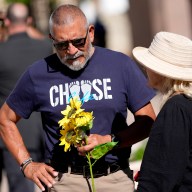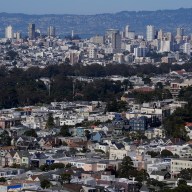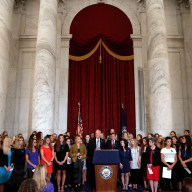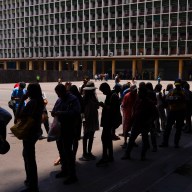Even glittering Dubai mandates traditional rules
People pass by in front of a coffee shop which is closed from morning until about 6 p.m. every day during the holy month of Ramadan in Dubai, United Arab Emirates.
Dubbed the Vegas Of The Middle East, Dubai has a reputation for excess: It boasts the world’s tallest buildings, the world’s biggest malls, the world’s most expensive hotels. Between the boom, the booze and the bling, it’s easy to forget that Dubai is part of the United Arab Emirates, a federation of Islamic states.
During the holy month of Ramadan (which runs until Oct. 12) traditional rules and regulations apply even in futuristic Dubai. From sunrise to sunset, fasting is in full swing.
kamran jebreili/associated press
A man leaves the Diwan mosque in Dubai, United Arab Emirates, last week, following Iftar, the meal that breaks the dawn-to-dusk fast during Ramadan.
Muslim worshippers restrain from eating, drinking, smoking and sex during the daylight hours. I’m told the practice is seen as an act of worship, and an exercise in self-control, humility and spiritual reflection.
For the traveller, it’s fascinating to visit the Middle East during Ramadan. It’s a month of festivities and great food, and a time to learn about Islamic culture. It’s also a time to score some sweet hotel discounts.
But travel during this time does come with a few challenges. Businesses hold atypical hours, restaurants are closed during the day and tours are cancelled. No one — including tourists — is allowed to eat, drink or smoke in public during the fasting hours. It’s not just respect for local culture. It’s the law.
So I’m shopping for pashminas in Dubai’s desert heat. Parched, I quickly forget Ramadan’s rules: I reach into my bag for a cold bottle of water, crack the top and, just as liquid relief touches my lips, I remember. No drinking in public. I look around and hope I haven’t offended anyone with my rookie mistake.
But I’m extremely thirsty, so I scan the streets looking for somewhere private to take a swig. I find a ladies washroom, lock myself in a stall and chug back mouthfuls of watery rejuvenation. I come to realize that, though cultural sensitivity is crucial, it’s not always convenient.
After sundown, when the fast is finally broken, restaurants across the city open their doors to serve elaborate and delicious Iftar buffets. But during the daylight hours, finding food isn’t so easy. Except for those few catering to foreigners, most restaurants in the city are closed. Sure, hotel restaurants are open but, for the frugal traveller, their prices are prohibitive.
Even across Dubai’s touristy shopping malls, the food courts are shut down. At Ibn Battuta Mall, Charley’s Subs is the only fast-food stall open. I order a BBQ chicken sandwich to go, but I’m not allowed to sit and eat it. Clutching my meal, I roam around the mall looking for a private spot to scarf down my combo. Lunch turns into a game of hide-and-eat.
Though Dubai’s policy presented some unexpected twists to my visit, I understand the reasons why the rules exist. So to those across Canada who are fasting during this holy month — Ramadan Kareem!
Freelance writer Julia Dimon is editor of The Travel Junkie and host of Word Travels, a new reality TV-series to be broadcast on OLN in 2008. Contact her at
www.thetraveljunkie.ca
.














